kevin_standlee (![[personal profile]](https://www.dreamwidth.org/img/silk/identity/user.png) kevin_standlee) wrote2015-06-06 11:06 pm
kevin_standlee) wrote2015-06-06 11:06 pm
Fort Stevens
On Friday afternoon, after turning in the last of the Day Jobbery, Lisa and I drove up to Warrenton to spend a few hours at Fort Stevens State Park. We went to the military portion of the park, which is the preserved remnants of the former US Army base established at the mouth of the Columbia River during the US Civil War that was active until after World War II.
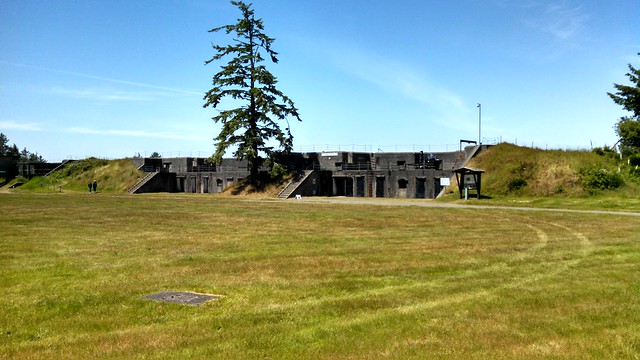
This is Battery Lewis (there's a Battery Clark elsewhere within the grounds), one of the first things you see from the parking area near the museum (former War Games building) where you buy your $5 day-use parking pass.
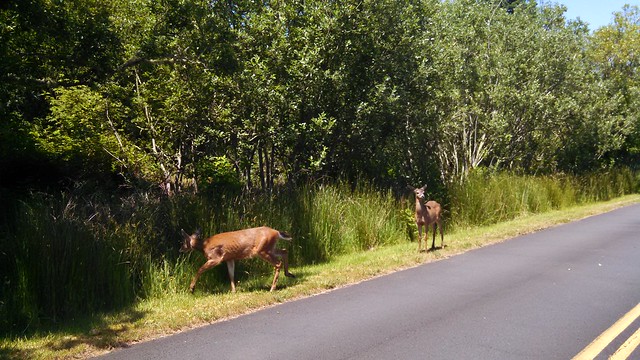
While entering the park we had a wildlife encounter. These two deer were on the road ahead of us. We slowed as a pickup came the other way. The deer came toward us and didn't actually exit the road until they were nearly right on top of us.

Fort Stevens is the only US military installation on the US mainland to come under direct attack in World War II, when a Japanese submarine shelled the area on the night of June 21-22, 1942. No significant harm was done to the fort, and indeed the documentation in the museum says that the sub commander didn't realize he was lobbing shells at a military base and that had he known, he wouldn't have done so. The commander of Fort Stevens did not allow the troops to shoot back; they could have done so with one of these "pop-up" guns (this is a re-creation being built by volunteers) that lifts above the concrete, fires a shell, then drops back down out of sight to reduce the amount of time that the enemy can see it. The story from the commander of the Japanese submarine I-25 says that if the Fort had fired back, they almost certainly could have sunk the sub.
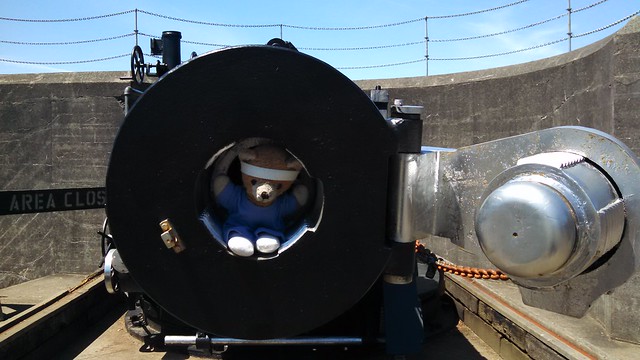
![[livejournal.com profile]](https://www.dreamwidth.org/img/external/lj-userinfo.gif) travelswithkuma did not appreciate being used as a stand-in for an artillery shell.
travelswithkuma did not appreciate being used as a stand-in for an artillery shell.

The concrete fortifications (nearly all that is left of the former base; anything worth stripping out and selling was removed when the base was decommissioned) are massive.

We walked down to Battery 245 further north. The guns here are similar to, but not the same as the ones that were here when it was an active shore base.
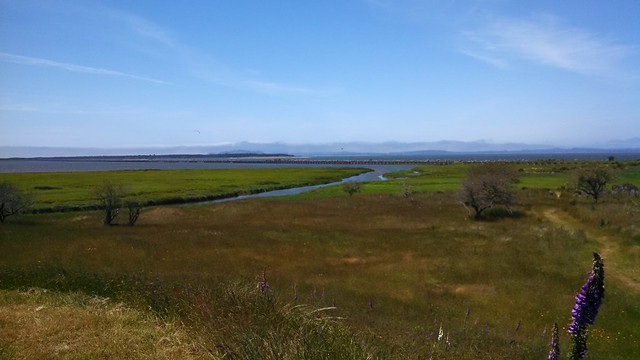
The view from the heights above the battery are very nice. That's Trestle Bay in the near distance, with the mouth of the Columbia ahead and Washington in the far distance. There was a companion fort across the Columbia at Cape Disappointment.
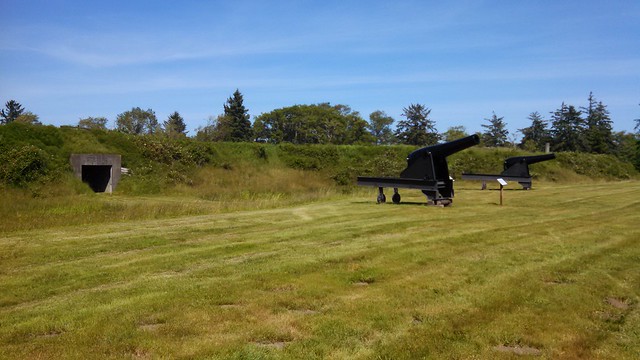
After a trip through the museum, we walked over to the original Civil War-era fort, which was a large embankment through which the only access was over a moat and through a sally port (the rectangular concrete area to the left). These smooth-bore cannon flank the approach to the entrance. The area inside the Embankment was converted to a parade ground when the fort was modernized for World War I.
As usual, click through these photos for additional shots of the park.
We could easily have spent a whole day here, but we only had a couple of hours, and our feet were hurting already (we've done a whole lot of walking this week). Lisa was glad to see this. She's been coming to Seaside for many years but never got to see Fort Stevens, and she'd always been curious about it.

This is Battery Lewis (there's a Battery Clark elsewhere within the grounds), one of the first things you see from the parking area near the museum (former War Games building) where you buy your $5 day-use parking pass.

While entering the park we had a wildlife encounter. These two deer were on the road ahead of us. We slowed as a pickup came the other way. The deer came toward us and didn't actually exit the road until they were nearly right on top of us.

Fort Stevens is the only US military installation on the US mainland to come under direct attack in World War II, when a Japanese submarine shelled the area on the night of June 21-22, 1942. No significant harm was done to the fort, and indeed the documentation in the museum says that the sub commander didn't realize he was lobbing shells at a military base and that had he known, he wouldn't have done so. The commander of Fort Stevens did not allow the troops to shoot back; they could have done so with one of these "pop-up" guns (this is a re-creation being built by volunteers) that lifts above the concrete, fires a shell, then drops back down out of sight to reduce the amount of time that the enemy can see it. The story from the commander of the Japanese submarine I-25 says that if the Fort had fired back, they almost certainly could have sunk the sub.


The concrete fortifications (nearly all that is left of the former base; anything worth stripping out and selling was removed when the base was decommissioned) are massive.

We walked down to Battery 245 further north. The guns here are similar to, but not the same as the ones that were here when it was an active shore base.

The view from the heights above the battery are very nice. That's Trestle Bay in the near distance, with the mouth of the Columbia ahead and Washington in the far distance. There was a companion fort across the Columbia at Cape Disappointment.

After a trip through the museum, we walked over to the original Civil War-era fort, which was a large embankment through which the only access was over a moat and through a sally port (the rectangular concrete area to the left). These smooth-bore cannon flank the approach to the entrance. The area inside the Embankment was converted to a parade ground when the fort was modernized for World War I.
As usual, click through these photos for additional shots of the park.
We could easily have spent a whole day here, but we only had a couple of hours, and our feet were hurting already (we've done a whole lot of walking this week). Lisa was glad to see this. She's been coming to Seaside for many years but never got to see Fort Stevens, and she'd always been curious about it.
no subject